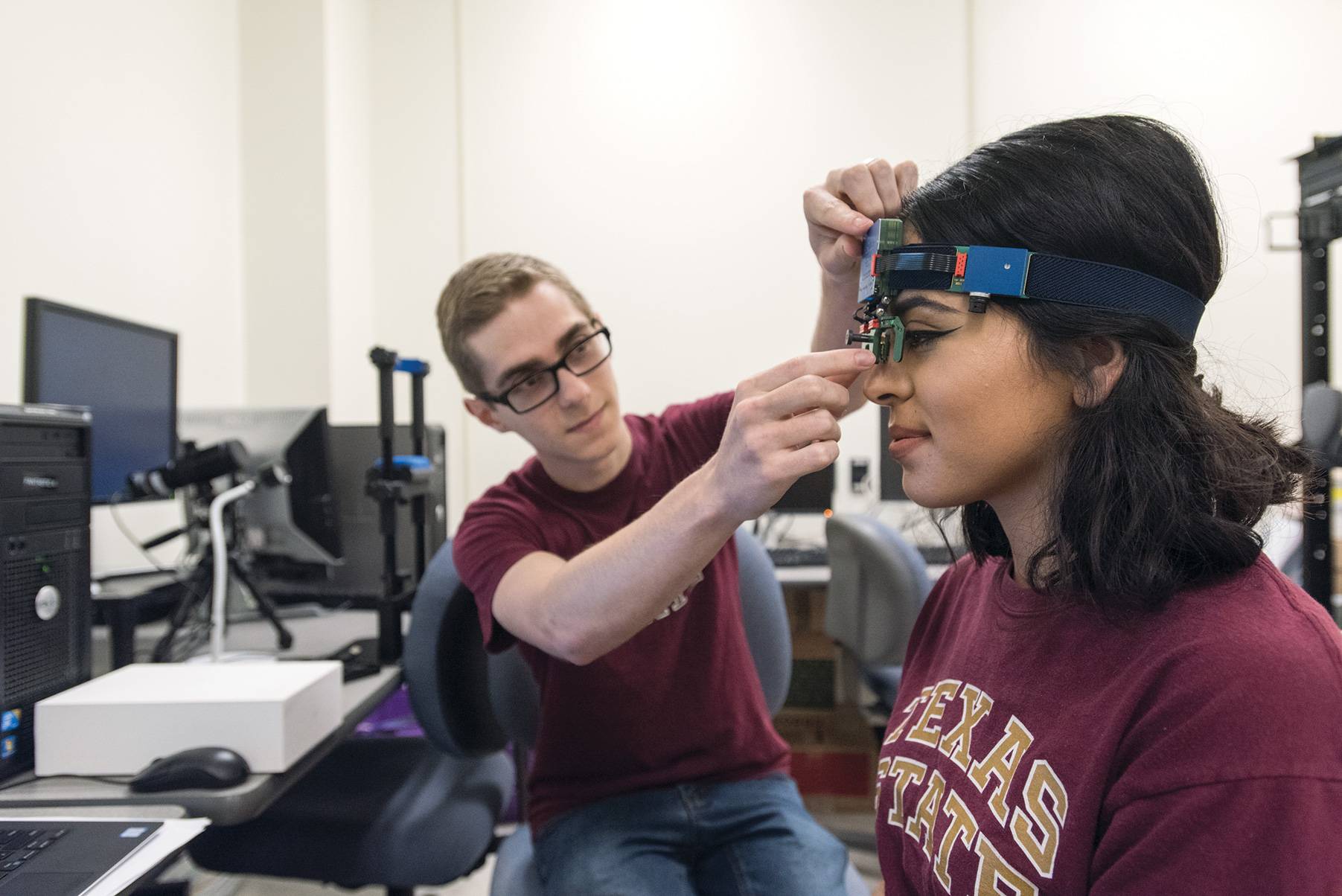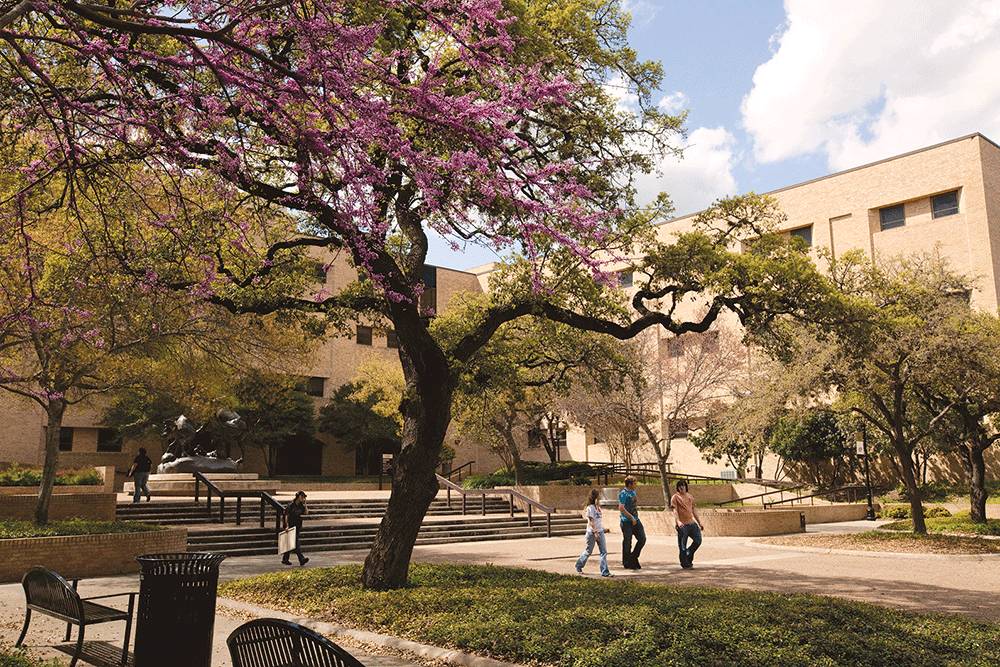This program provides students with the knowledge and skills to gain an edge in the computer science job market.
Computer Science

Program Overview
Texas State's Department of Computer Science is known for cutting-edge curricula, a dedicated faculty, and well-equipped and remotely accessible laboratory facilities. Combined, these elements provide students with hands-on experience while implementing classroom concepts, providing the specialized training graduates need to land the best jobs.
Course Work
The M.S. in computer science program offers a 30-credit-hour thesis or non-thesis option. A concentration in data science is offered in the non-thesis option. Both require the completion of graduate core courses and electives.
The M.A. in computer science program offers a 30-credit-hour-thesis or non-thesis option. Both require the completion of graduate core courses, electives and a minor.
Areas of study in the computer science program include machine learning, databases/data mining, data compression, computer networks and cyber security, high-performance computing, image processing, bioinformatics, and more.
| Degree | Concentration | Hours | Thesis Option | Minor Option | Location |
|---|---|---|---|---|---|
Degree M.A. | Concentration No concentration | Hours 30 | Thesis Option Non-Thesis | Minor Option Minor required | Location San Marcos/Round Rock |
Degree M.A. | Concentration No concentration | Hours 30 | Thesis Option Thesis | Minor Option Minor required | Location San Marcos |
Degree M.S. | Concentration No concentration | Hours 30 | Thesis Option Non-Thesis | Minor Option Minor required within the College of Science | Location San Marcos/Round Rock |
Degree M.S. | Concentration No concentration | Hours 30 | Thesis Option Thesis | Minor Option Minor required within the College of Science | Location San Marcos |
Degree M.S. | Concentration No concentration | Hours 30 | Thesis Option Non-Thesis | Minor Option No minor required | Location San Marcos/Round Rock |
Degree M.S. | Concentration No concentration | Hours 30 | Thesis Option Thesis | Minor Option No minor required | Location San Marcos |
Degree M.S. | Concentration Data Science | Hours 30 | Thesis Option Thesis | Minor Option No minor required | Location San Marcos |
Degree M.S. | Concentration Data Science | Hours 30 | Thesis Option Non-Thesis | Minor Option No minor required | Location San Marcos |
Degree M.S. | Concentration Software Engineering | Hours 30 | Thesis Option Thesis | Minor Option No minor required | Location San Marcos |
Degree M.S. | Concentration Software Engineering | Hours 30 | Thesis Option Non-Thesis | Minor Option No minor required | Location San Marcos/Round Rock |
This program can be completed in Round Rock, though taking courses in both San Marcos and Round Rock will result in quicker degree completion.
Program Details
The department accommodates working professionals by offering flexible course scheduling options with classes available during the evenings and on the Round Rock Campus.
Program Mission
The mission of the Department of Computer Science is to advance the knowledge of computer science and technology through education, research and service for the betterment of industry, government and society. The department seeks to expand its depth and breadth in the research and study of applied computing and strives to provide graduate students with strong technical backgrounds and communication skills.
Related Programs: Ph.D. in Computer Science
Career Options
Both M.S. and M.A. graduates pursue careers in software development and maintenance, system management and system analysis. The majority of graduates, about 60%, work in private companies like Google, Amazon, Intel, IBM, and Dell. About 30% of graduates work in various city, state and federal agencies. About 10% go on to pursue doctoral degrees.
Program Faculty
The department has both tenured and tenure-track faculty members actively pursuing research in artificial intelligence, bioinformatics, computer communication and networking, cyber security and trustworthy computing, database and information systems, distributed and parallel computing, high-performance computing, human-computer interaction, image retrieval, multimedia computing, software engineering, green/sustainable computing and social computing. Faculty research has received federal and industry funding support from NSF, NIST, DOD, DOE, IBM, Intel, AMD, and others. The faculty has obtained prestigious awards, including NSF CAREER awards and IBM and Google Faculty Fellowships.
Contact us for general questions about your application, funding opportunities, and more. If you have specific questions after reviewing the program details, contact the program's graduate advisor.

Already know that Texas State is right for you?
Application Deadlines
-
For Entry Prior to Summer 2026
DEADLINES U.S. CITIZEN INTERNATIONAL Fall - Priority February 1 February 1 Fall - Standard June 15 June 1 Spring October 15 October 1 -
Effective for Summer 2026 Entry and Beyond
DEADLINES U.S. CITIZEN INTERNATIONAL Fall - Priority February 1 February 1 Fall - Standard August 1 June 1 Spring - Priority September 1 September 1 Spring - Standard November 1 October 1
For important information regarding deadlines and decision timelines, review the Application Policy Information page.
Admission Requirements
The items required for admission consideration are listed below. Additional information for applicants with international credentials can be found on our international webpages.
-
Application
- completed online application
Review important information about the online application.
-
Application Fee
- $55 nonrefundable application fee, OR
- $90 nonrefundable application fee for applications with international credentials
Review important information about application fees.
-
Transcripts & GPA
- Baccalaureate degree from a regionally accredited university. (Non-U.S. degrees must be equivalent to a four-year U.S. Bachelor’s degree. In most cases, three-year degrees are not considered. Visit our International FAQs for more information.)
- A copy of an official transcript from each institution where course credit was granted.
- A 2.75 overall GPA or a 2.75 GPA in your last 60 hours of undergraduate course work (plus any completed graduate courses).
- Background course work.
Review important information about transcripts. Official transcripts, sent directly from your institution, will be required if admission is granted.
-
Test Scores
GRE
- official GRE (general test only) required with competitive scores in the verbal reasoning and quantitative reasoning sections
The GRE may be waived if you hold a master's or doctoral degree from a regionally accredited U.S. institution. If you hold a master's or doctoral degree (or the equivalent thereof) from an accredited international institution, the GRE may be waived on an individual basis.
Effective Spring 2027
- GRE not required
Approved English Proficiency Exam Scores
Applicants are required to submit an approved English proficiency exam score that meets the minimum program requirements below unless they have earned a bachelor’s degree or higher from a regionally accredited U.S. institution or the equivalent from a country on our exempt countries list.
- official TOEFL iBT scores required with a 78 overall
- official PTE scores required with a 52 overall
- official IELTS (academic) scores required with a 6.5 overall and minimum individual module scores of 6.0
- official Duolingo scores required with a 110 overall
- official TOEFL Essentials scores required with an 8.5 overall
Review important information about official test scores.
-
Documents
- resume/CV
- statement of purpose
- three letters of recommendation
Review important information about documents.
-
Diagnostic Interview
If you are accepted to the program, you will participate in a diagnostic interview with the graduate advisor. This interview will include a review of test scores, grades, and work history. In some cases, additional courses may be added to your degree program.